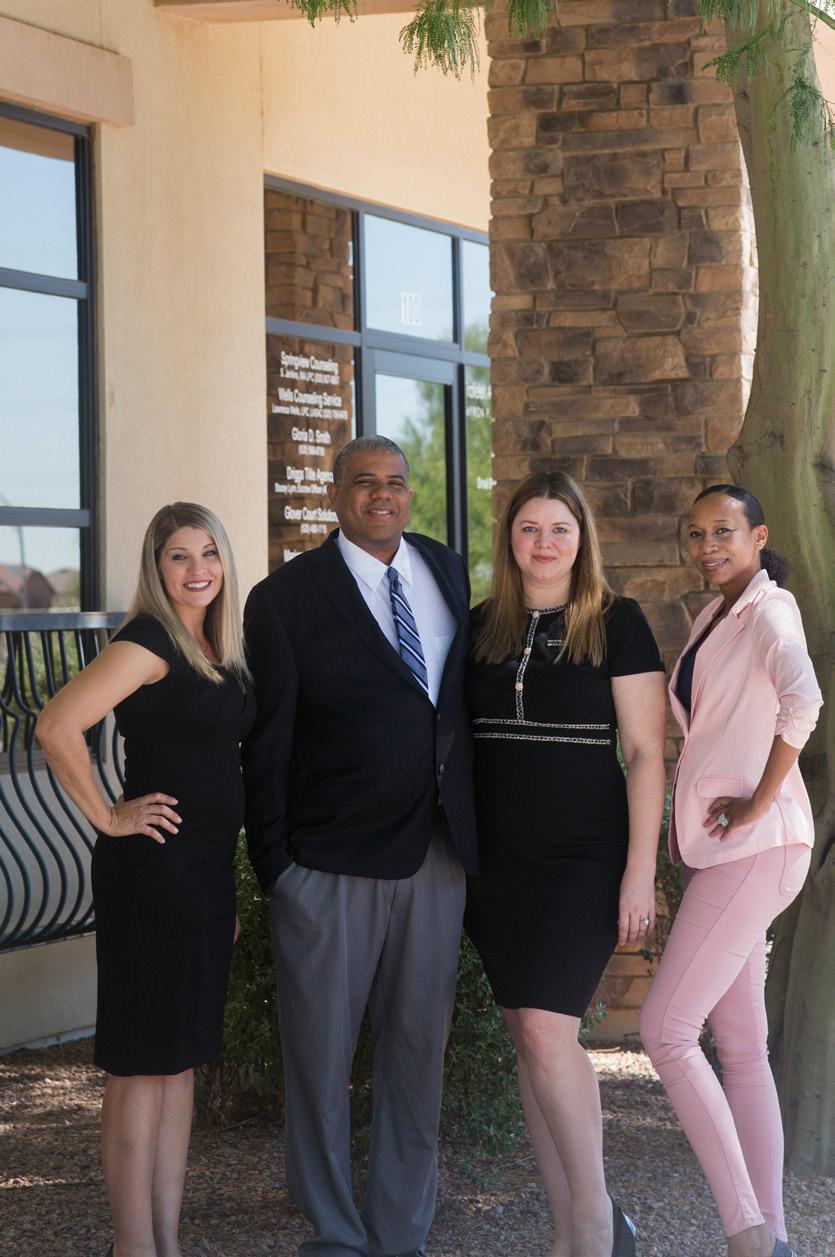
5 minute read
NEW LAW IN EFFECT RE: Dissolution of Marriage (Divorce) or Legal Separation
by Patricia Glover, CLDP, CP/ACP, CNSA Certified Legal Document Preparer, Glover Court Solutions & Estate Planning

Arizona state law (A.R.S. § 25314.01) now provides for a streamlined procedure when the parties (spouses) have reached a settlement and are in agreement as to the terms of dissolution/separation (e.g., parenting time, division of debts and assets, spousal support, etc.). If such a settlement is made prior to either spouse filing case-initiating documents with the court, the parties may jointly file a summary consent petition. The filing fee for a summary consent decree is fifty percent of the combined filing fee for a petition and answer, together with any additional filing fees assessed by the county. After 60 days following the filing of the petition, the court may enter a final decree. This process is anticipated to be a costeffective option for non-contested divorce proceedings and will help to streamline the process for spouses who are in agreement as to the terms of their dissolution/separation.










It’s necessary and we have to use it. But that’s not the best use of our funds. It’s about $30,000 to keep somebody in prison. It’s about $3,000 to get them on probation.
Eighty-three percent of people who go to prison are going to be arrested for a new offense. If you put them on probation the numbers are almost completely flipped. And that’s really what I ran on. And after four years, the public gave me another four years, and I’m hoping in a couple years they’ll give me yet another four years.
Grande LIVING: What are some of the changes that you’ve implemented in the county attorney’s office?
Kent Volkmer: There is a perverse incentive in the criminal justice system for prosecutors to charge the highest possible charge that they can because it gives us the maximum amount of leverage. And if you maximize the amount of leverage, you can force a plea deal because, hey, if you roll the dice and take a chance, you could be going to prison for 10 years.
If I offer you two years, suddenly that offer looks really reasonable.
There’s a big difference between the felony and the misdemeanor as well. So, one of the things that I implemented very early on is don’t charge felonies just because it maximizes leverage. I believe that’s manipulating the justice system.
The county attorney’s office already has a lot of power. We’re given a lot of authority. It doesn’t make sense that we manipulate systems to further give us an advantage. Instead, we’re called upon to be the straight shooters in the system.
I’m a firm believer in diversion. Real quick, the vast majority of people who commit a criminal offense are at the absolute low point of their life. Whether they’re in the throes of addiction, whether they’re suffering from mental health distress, whether they’re just at a bad time in their life. They’re usually drunk, high or having other issues going on in their life.
The criminal justice system historically has not done a good job of distinguishing between people who are truly dangerous and people who made a really dumb decision.
And I think justice is distinguishing between those dangerous people we need to lock up and those people that made a dumb decision. We need to figure out a way to help them and not brand them so they can’t get a job and provide for their family and be an outcast from our society.
Continued from page 17
Grande LIVING: Break the cycle of the multigenerational drug dealers.
Kent Volkmer: Exactly. So diversion is that opportunity where we’re saying, “Hey, you need a little help. You don’t need to be branded a criminal for the rest of your life.”
We do a battery of assessments. We don’t tell them what services they need to complete, but we send them to professionals who do the assessment and say, “Hey, this is what would benefit you.” And then we tell them, “Hey, you do what they said. You complete those services. Whether it’s anger management, whether it’s substance abuse, whether it is mental health compliance, whatever it is, you complete those consequences, do a little community service and we’ll dismiss your charges in their entirety.”
And it’s been a really successful program. In 2014, which is just an easy number for me, there were seven people offered diversion. Last year, we had just over 500 people that we brought into the program.
And the other thing that we did that I’m very proud of is we have really focused on individualized justice. Instead of assembly-line justice, what we focus on is the impact to the very fabric of our society.
Look at the person, look at the circumstances, look at the impact on our community, and then figure out what the appropriate consequences moving forward are. And that’s what I call the individualized justice model that we’ve been pursuing.
We’ve reduced the number of people going to prison by about
35% on an annual basis. We’ve reduced the number of felony charges in our community by about 20%. We’ve put about 40% more people on probation, yet we’re as safe as we’ve ever been.
And what we found is those people have responded incredibly well to that approach. So I’m very proud of that sort of philosophy. And frankly, nationally, we’re starting to get recognition.
I mean, I fly out a few times a year to talk with other groups and other entities about how you can make sure that your basic fundamental public safety responsibilities are being met without throwing everybody in prison. And that’s sort of a crazy idea because in today’s world, you either let everybody out and you hug them or you throw everybody in prison and you condemn them.
Grande LIVING: Like everything, the 80/20 rule applies in this instance. You have 10% at the low end, 10% at the high end, and then there’s that 80% that straddles the middle.
Kent Volkmer: Yes. But prosecutors are usually in those two 10% on either end instead of the 80. There’s very few of us that can get elected in the middle because generally people want an elevator speech — either “I lock up bad people,” or “I love people, and I restore people.” And this is a much more nuanced conversation.
Grande LIVING: In today’s world, how does the county attorney’s office deal with social media justice, which says, “Lock them all up?”
Kent Volkmer: The thing is, we have ethical rules that bind what we can and cannot say. So oftentimes there’s misconceptions out in the public about even the facts of the case that becomes very complicated for us. What I like to explain to people, when I have enough time, is justice is a very difficult or fickle concept because of depending on what side of the criminal justice equation you find yourself.
So you end up angering all sides. But that’s really what our responsibility is. Our ethical obligation is to be a minister of justice. We first have to define what justice is and describe how we meet it. And that’s really how we meet it. Because if I am just meeting the victim’s version of justice, I’m leaving everybody else out in the cold. If I am just meeting the defendant’s version of justice, I’m leaving the victims and everybody else out in the cold.
Grande LIVING: And then there’s the fourth side — the legislators have passed laws you are now tied to?
Kent Volkmer: Yes, it is difficult. Look, our legislators mean well, and I believe that in their minds they’re doing the right thing. But I think they tend to be prisoners of the moment.

They have a constituent that comes up and tells them a story that is outrageous, that offends the sensibilities of everybody. And their solution is, “Hey, we’re going to fix that problem.”
Continued on page 96






















